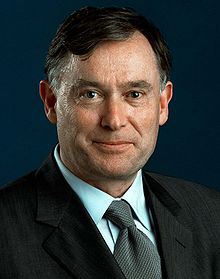

President of Germany
22 February 1943 Heidenstein, General Government
-
1 July 2004 – 31 May 2010
German politician This article is about a politician. For other people, see Köhler. For the German Olympic equestrian, see Horst Köhler (equestrian). Horst Köhler Bundespräsident a.D. OMRI GColIHKöhler in 2004President of GermanyIn office 1 July 2004 – 31 May 2010ChancellorGerhard Schröder Angela MerkelPreceded by Johannes RauSucceeded by Christian WulffManaging Director of the International Monetary FundIn office 1 May 2000 – 4 March 2004First DeputyStanley Fischer Anne Osborn KruegerPreceded by Michel CamdessusSucceeded by Anne Osborn Krueger (Acting) President of the European Bank for Reconstruction and DevelopmentIn office September 1998 – April 2000Preceded by Jacques de LarosièreSucceeded by Jean Lemierre Personal detailsBorn (1943-02-22 ) 22 February 1943 (age 78) Heidenstein, General Government (now Skierbieszów, Poland) Political partyChristian Democratic UnionSpouse(s)Eva BohnetChildrenUlrike JochenParentsEduard Köhler Elisabeth BernhardAlma materUniversity of TübingenSignatureWebsiteOfficial website Horst Köhler (German: ( listen ) ; born 22 February 1943) is a German politician of the Christian Democratic Union, and served as President of Germany from 2004 to 2010. As the candidate of the two Christian Democratic sister parties, the CDU and the CSU, and the liberal FDP, Köhler was elected to his first five-year term by the Federal Assembly on 23 May 2004 and was subsequently inaugurated on 1 July 2004. He was reelected to a second term on 23 May 2009. Just a year later, on 31 May 2010, he resigned from his office in a controversy over his comment on the role of the German Bundeswehr in light of a visit to the troops in Afghanistan. During his tenure as German President, whose office is mostly concerned with ceremonial matters, Köhler was a highly popular politician, with approval rates above those of both chancellor Gerhard Schröder and later chancellor Angela Merkel. Köhler is an economist by profession. Prior to his election as President, Köhler had a distinguished career in politics and the civil service and as a banking executive. He was President of the European Bank for Reconstruction and Development from 1998 to 2000 and head of the International Monetary Fund (IMF) from 2000 to 2004. From 2012 to 2013, Köhler served on the UN Secretary General's High-level Panel on the Post-2015 Development Agenda.

We use cookies
We use cookies and other tracking technologies to improve your browsing experience on our website, to show you personalized content and targeted ads, to analyze our website traffic, and to understand where our visitors are coming from. Privacy Policy.